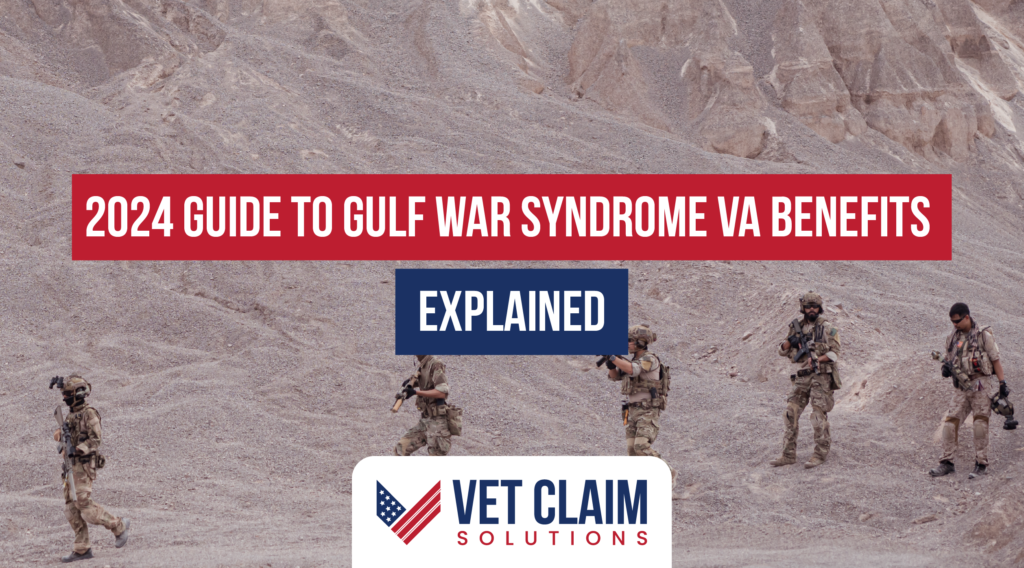Hey there! If you’re a veteran or know someone who served in the Gulf War, you might be wondering what benefits are available through the VA. The truth is, navigating these benefits can feel overwhelming with so much information out there.
The good news? Our 2024 Guide to Gulf War Syndrome VA Benefits is here to help you understand everything from disability compensation rates to qualifying conditions without all the confusing jargon.
You’ll learn how service connection works and why certain illnesses are presumed related to your time in Southwest Asia. Let’s break it down step-by-step so you get the support you’ve earned!
Understanding Gulf War Syndrome

Gulf War Syndrome (GWS) is a complex and often misunderstood condition affecting veterans of the 1990-1991 Gulf War. It’s a cluster of chronic symptoms that can include fatigue, headaches, joint pain, indigestion, insomnia, dizziness, respiratory disorders, and memory problems.
Definition of Gulf War Syndrome
Gulf War Syndrome (GWS), also known as ‘Desert Storm Diseases’ or ‘Gulf War Illness,’ encompasses a wide range of chronic symptoms reported by U.S. military veterans and government employees who served in the first Gulf War since August 1990.

Common Symptoms
The VA presumes certain chronic, unexplained symptoms existing for six months or more are related to Gulf War service without regard to cause. These symptoms include fatigue, headaches, joint pain, indigestion, insomnia, dizziness, respiratory disorders, and memory problems.

Diagnosis Challenges
Gulf War Syndrome can be challenging to diagnose due to the wide range of symptoms and lack of a single, identifiable cause. Many Gulf War veterans experience medically unexplained illnesses that do not have a clear diagnosis.
VA Benefits for Gulf War Veterans
If you’re a Gulf War veteran struggling with unexplained symptoms, you may be eligible for VA disability benefits. The VA has recognized certain presumptive conditions related to Gulf War service.

Presumptive Conditions
Gulf War Veterans, or veterans serving from August 2, 1990 to the present, who meet certain criteria do not need to prove a connection between their military service and illnesses in order to receive VA disability compensation.

Service Connection
The PACT Act now provides compensation for Gulf War veterans through presumptive benefits, making it easier for them to obtain service connection for conditions they develop due to their service in the Gulf War.

Compensation Rates
All service-connected disabilities receive a rating, which are then combined into the veteran’s combined rating. A combined rating ranges between 0 and 100 percent, in increments of 10 percent. However, to be eligible for benefits for “Gulf War Syndrome,” you must receive a 10 percent disability rating or higher.

Applying for Benefits
To apply for VA disability benefits for Gulf War Syndrome, veterans need to submit a claim to the VA along with medical evidence of their diagnosed conditions or symptoms. It’s important to work with a knowledgeable Veterans Service Organization or attorney to navigate the claims process.
Eligibility for Gulf War Syndrome VA Benefits
Not every veteran who served in the Gulf War is eligible for these presumptive benefits. There are specific service requirements, qualifying locations, and time periods that determine eligibility.

Service Requirements
Gulf War veterans, or veterans serving from August 2, 1990 to the present, who meet certain criteria do not need to prove a connection between their military service and illnesses in order to receive VA disability compensation.

Qualifying Locations
To be eligible for Gulf War Syndrome VA benefits, veterans must have served in the Southwest Asia theater of operations, which includes Iraq, Kuwait, Saudi Arabia, the neutral zone between Iraq and Saudi Arabia, Bahrain, Qatar, the United Arab Emirates, Oman, the Gulf of Aden, the Gulf of Oman, the Persian Gulf, the Arabian Sea, the Red Sea, and the airspace above these locations.

Time Periods
The VA considers Gulf War service as active military duty in any of the above locations at any time from August 2, 1990 to the present. For VA disability compensation, this includes veterans with undiagnosed illnesses from service in the Southwest Asia theater of operations from August 2, 1990 to December 31, 2021 or Afghanistan, Djibouti, Syria, and Uzbekistan from September 19, 2001 to December 31, 2021.
Secondary Conditions Associated with Gulf War Syndrome
In addition to the presumptive conditions directly related to Gulf War service, veterans may also be eligible for benefits for secondary conditions that developed as a result of their Gulf War Syndrome.
Common Secondary Conditions
Veterans who believe they have symptoms of Gulf War Syndrome should also consider related presumptive conditions linked to Gulf War service, such as chronic fatigue syndrome, fibromyalgia, functional gastrointestinal disorders, and undiagnosed illnesses. These conditions may be eligible for VA disability benefits as well.
Establishing Service Connection
New evidence from May 2022 links sarin gas exposure to Gulf War Syndrome, supporting veterans’ suspicions and marking a significant step toward proper treatment and establishing service connection for their conditions.
Key Takeaway:
Gulf War Syndrome (GWS) affects veterans with chronic symptoms like fatigue, headaches, and joint pain. If you’re a Gulf War veteran facing these issues, you may be eligible for VA disability benefits through presumptive conditions without proving the cause.
The Compensation and Pension Exam for Gulf War Syndrome

If you’re a Gulf War veteran filing a disability claim for Gulf War Syndrome, you’ll likely need to undergo a Compensation and Pension (C&P) exam. The VA orders this medical examination to evaluate the conditions you’re claiming and determine if they’re related to your military service.

Purpose of the Exam
The main goal of the C&P exam is to help the VA decide if your Gulf War Syndrome symptoms are connected to your service and how severe they are. The examiner will review your medical and service records, ask about your symptoms and medical history, and perform a physical examination. They may also order diagnostic tests if needed.

What to Expect
During the exam, be prepared to discuss your Gulf War Syndrome symptoms in detail. Explain how they’ve impacted your daily life and ability to work. The examiner will likely ask when your symptoms started, how often they occur, and how severe they are. Be honest and specific in your answers.

Preparing for the Exam
To get ready for your C&P exam, gather all relevant medical records and a list of your symptoms and treatments. It’s also a good idea to bring a copy of your VA claim. Consider bringing a friend or family member for support and to take notes during the exam. Arrive early, dress comfortably, and be prepared to spend several hours at the appointment. Remember, the C&P exam is a crucial piece of evidence in your Gulf War Syndrome claim. Be thorough, honest, and patient in explaining your condition to the examiner.
VA Health Care for Gulf War Veterans

As a Gulf War veteran, you may be eligible for VA health care benefits, including treatment for Gulf War Syndrome and related conditions. The VA offers a range of health care services to help you manage your symptoms and improve your quality of life.
Priority Group Placement
When you enroll in VA health care, you’ll be assigned to a priority group based on your service-connected disabilities, income, and other factors. Gulf War veterans with service-connected conditions, including presumptive conditions related to Gulf War service, are typically placed in higher priority groups. This means you’ll have priority access to VA health care services and may have lower copayments.
Gulf War Registry Health Exam
The VA offers a free Gulf War Registry Health Exam to all eligible veterans who served in the Gulf War. This comprehensive medical assessment can help identify health concerns related to your service. During the exam, a VA health care provider will review your medical history, perform a physical exam, and may order diagnostic tests. The exam can also connect you with follow-up care and benefits. To schedule a Gulf War Registry Health Exam, contact your local VA Environmental Health Coordinator.
Treatment Options
The VA offers a variety of treatment options for Gulf War Syndrome, depending on your specific symptoms and needs. These may include: – Medications to manage pain, fatigue, and other symptoms – Cognitive behavioral therapy for mental health concerns – Physical therapy and rehabilitation services – Complementary and alternative therapies, such as acupuncture or massage Your VA health care team will work with you to develop a personalized treatment plan based on your unique needs and goals. They’ll also coordinate your care across different specialties and services.
Additional Resources for Gulf War Veterans

Navigating VA benefits and health care can be complex, especially when dealing with a condition like Gulf War Syndrome. Fortunately, there are many resources available to help you along the way.
Veterans Service Organizations
Veterans Service Organizations (VSOs) like the American Legion, Disabled American Veterans (DAV), and Veterans of Foreign Wars (VFW) offer free assistance with VA claims and appeals. These organizations have trained representatives who can help you gather evidence, fill out paperwork, and advocate on your behalf. They can also connect you with other resources and support services. To find a VSO near you, visit the VA’s VSO Directory.
Online Support Groups
Connecting with other veterans who have Gulf War Syndrome can be a valuable source of support and information. Online support groups provide a safe space to share experiences, ask questions, and learn from others who understand what you’re going through. Some popular online support groups for Gulf War veterans include: – Gulf War Illness Community on Facebook – Gulf War Syndrome Support Group on Daily Strength – Gulf War Veterans Illnesses on Reddit Remember to protect your privacy and be cautious about sharing personal information online.
Research Studies
The VA and other organizations conduct ongoing research studies to better understand and treat Gulf War Syndrome. Participating in a research study can help advance scientific knowledge and potentially improve care for future generations of veterans. To learn about current research studies on Gulf War Syndrome, visit the VA’s Gulf War Research webpage or search the ClinicalTrials.gov database. Before enrolling in a study, make sure to review the eligibility criteria, risks, and benefits with the research team.
Key Takeaway:
For Gulf War veterans, the C&P exam is vital for your disability claim. Be ready to discuss symptoms and impacts on daily life. Bring medical records and support if needed.
Conclusion
The portrayal of AI as an ominous force out of control couldn’t be further from reality. Unlike Hollywood’s doomsday scenarios featuring rogue robots plotting world domination (looking at you, Terminator), AI actually supports us in our everyday lives by enhancing efficiency and improving experiences we often take for granted.
A great example lies right within our households—smart assistants that manage daily tasks effortlessly or fraud detection systems safeguarding financial transactions quietly behind the scenes.
The real narrative isn’t one filled with fear but rather appreciation for this technology silently making things easier since its inception back in early ’60s innovations; now deeply woven into modern conveniences surrounding us today across diverse domains globally affecting everyone positively alike!


